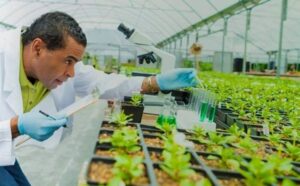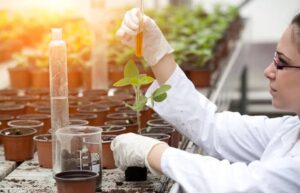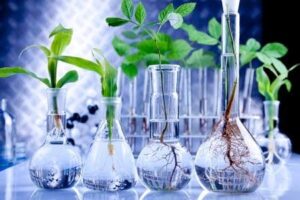Back to: Botany 300 Level
Hello, my brilliant friend! I hope you’re having a great day! Have you ever wondered how farmers produce disease-resistant yams, or how scientists create crops that grow faster and yield more food? The secret lies in the power of agriculture and biotechnology! These fields help improve farming, protect plants from pests, and even make crops more nutritious. Today, we’ll explore how science is transforming agriculture and making food production more efficient!
Applications in agriculture and biotechnology
Understanding Agricultural Biotechnology
Agricultural biotechnology is the use of scientific techniques to improve plants, animals, and microorganisms for farming. It involves:
Genetic engineering (modifying plant DNA to improve traits)
Tissue culture (growing plants from small cells)

Marker-assisted breeding (identifying the best plant genes for breeding)
Biofertilisers and biopesticides (using natural microorganisms to boost plant growth)
Applications of Biotechnology in Agriculture
Improved Crop Varieties
Scientists modify plant DNA to produce crops that are disease-resistant, drought-tolerant, and high-yielding.
Example: Genetically modified (GM) maize is resistant to pests like the fall armyworm.
Disease-Free Plants Through Tissue Culture
Farmers can grow healthy, virus-free crops using tissue culture techniques.
Example: Bananas, cassava, and yams are produced using tissue culture for higher yields.
Pest and Disease Resistance
Scientists develop plants with natural resistance to pests and diseases.
Example: Bt cotton produces a natural toxin that kills insects, reducing the need for chemical pesticides.
Faster Plant Growth and Increased Yield
Biotechnology helps produce fast-growing crops that mature quickly.

Example: Genetically modified rice grows faster and produces more grains per plant.
Drought and Climate Resistance
Some crops are genetically improved to survive in dry or harsh conditions.
Example: Drought-tolerant maize helps farmers grow food even in dry regions.
Biofertilisers and Biopesticides
Instead of using chemicals, farmers now use friendly bacteria and fungi to improve soil health.
Example: Rhizobium bacteria help legumes (e.g., cowpea and soybeans) fix nitrogen naturally.
Nutrient-Enriched Crops (Biofortification)
Scientists improve the nutrient content of crops to fight malnutrition.
Example: Golden rice is genetically modified to contain more vitamin A, helping prevent blindness in children.
Genetic Modification for Better Storage
Some crops are modified to have a longer shelf life and reduce food waste.
Example: Flavr Savr tomatoes last longer without spoiling.

The Role of Biotechnology in Sustainable Agriculture
Biotechnology reduces the use of chemicals, helps farmers grow more food with less land, and protects the environment. By using natural methods instead of harmful pesticides and fertilisers, we can make farming more sustainable!
A Simple Story to Understand This Concept
Imagine you are a farmer who grows tomatoes. Every year, insects attack your crops, and drought reduces your harvest. But one day, scientists give you a new type of tomato that is naturally resistant to pests and can survive with less water. Now, you produce more tomatoes with less effort! That’s how biotechnology is changing farming!
Summary
Agricultural biotechnology helps improve crops using scientific methods like genetic engineering and tissue culture.
It helps in disease resistance, pest control, drought tolerance, and increased food production.
Biofortified crops provide extra nutrients to fight malnutrition.
Biopesticides and biofertilisers help farmers grow food naturally without harming the environment.
This technology makes farming more efficient, productive, and sustainable!
Evaluation
- What is agricultural biotechnology?
- How does tissue culture help in farming?
- Give two examples of genetically modified (GM) crops and their benefits.
- What is the importance of biofortification in food production?
- Why is biotechnology important for sustainable agriculture?
You are doing an amazing job! Now, the next time you see a healthy bunch of bananas or a pest-free farm, remember that biotechnology might be behind it! Keep learning with Afrilearn, and I’ll see you in the next exciting lesson. Stay curious and keep growing!
